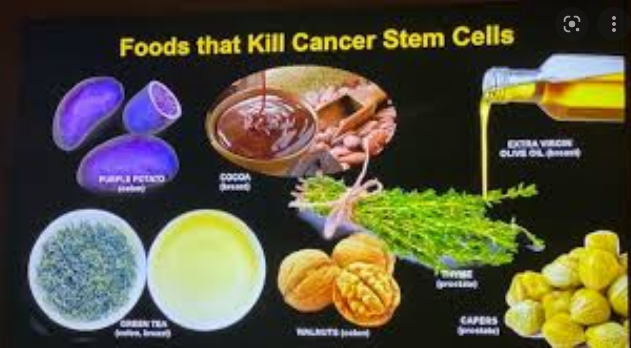Disease undeveloped cells are answerable for starting numerous malignant growths, as well as touching off the repeat of tumors after treatment. Here are the top disease undeveloped cell killing food sources.
Green Tea and Matcha Tea
Green tea has numerous helpful capacities, including the capacity to kill disease undeveloped cells. Researchers at Nanjing Medical University and Sun Yat-Sen University Cancer Center in China concentrated on the impact of the green tea polyphenol, epigallocatechin-3-gallate (EGCG), in the lab and observed that it could decrease the development of colon malignant growth foundational microorganisms by 50%.
Furthermore, EGCG constrained the malignant growth foundational microorganisms to submit cell self-destruction through the course of apoptosis. One more review from the University of Salford in England showed that matcha green tea, a type of powdered tea leaf, can intrude on the metabolic pathway of bosom disease immature microorganisms, denying them of energy and making them pass on. The impact of the EGCG in green tea on focusing on disease foundational microorganisms might assist with making sense of the defensive impacts of tea against colon and different malignant growths.
Purple Potatoes
Beginning from Peru, purple potatoes were valued by the old Inca for their nutritive advantages. They contain the bioactive anthocyanin, a blue-purple color that likewise gives numerous dim berries their shade. Researchers at Penn State University investigated the impact of purple potatoes on malignant growth immature microorganisms. In the lab, they took care of mice that are at a high gamble for creating colon malignant growth which might be compared to one purple potato (Purple Majesty assortment) every day for seven days.
They contrasted the impacts of the potato and that of a calming drug called Sulindac, which is known to stifle colon polyps and colon disease improvement. Following multi week, the colons of the mice were inspected. The mice who took care of purple potatoes had 50% fewer cancers. At the point when the colon tissues were all the more firmly analyzed under the magnifying instrument, there was a 40 percent increment in the killing of colon disease foundational microorganisms contrasted with the gathering that didn’t eat purple potatoes. They observed that the malignant growth undeveloped cells in mice who took care of purple potatoes were denied of key endurance factors.
At the point when the researchers eliminated the malignant growth immature microorganisms from the mice and presented them to a purple potato extricate, they observed the concentrate caused a 22 overlap decrease of forcefulness in the way of behaving of the disease undifferentiated cells.
The researchers arranged the purple potato in various ways, including baking, dicing, and freeze-drying, yet the bioactive disease undeveloped cell battling parts have all the earmarks of being steady much under various circumstances and readiness methods. Given their belongings, purple potatoes might have notwithstanding their magnificent shading highlights special disease battling properties that customary white potatoes don’t.
Pecans
Pecans are famous tree nuts that are eaten crude, simmered, sugar-coated, or even salted. They are supplement thick and contain bioactive like gallic corrosive, chlorogenic corrosive, and ellagic corrosive. As portrayed before, eating pecans is related to a decreased gamble for creating colon malignant growth and furthermore further develops endurance in patients who have colon disease. Researchers from Ewha Woman’s University, Seoul National University, and Sungkyunkan University in South Korea read up a pecan extricate for its capacity
to kill malignant growth foundational microorganisms.
In the lab, they developed colon disease immature microorganisms detached from a patient and presented the cells to a pecan remove. Following two days of openness, the quantity of disease foundational microorganisms treated with pecan separate declined by 34%. By six days, there was a shocking 86 percent concealment of disease foundational microorganism development. The strong impact of pecans on malignant growth foundational microorganisms could assist with making sense of the consequences of the investigation of 826 patients with stage 3 colon disease who had a 57 percent lower chance of death, and a 42 percent lower chance of malignant growth repeat related with eating nuts. Assuming you have colon malignant growth, eating pecans may in a real sense save your life.
Additional Virgin Olive Oil
Additional virgin olive oil contains a class of bioactive known as secoiridoids, which address up to 46 percent of the all-out polyphenols present in olive oil. These regular synthetic compounds are caught up in the small digestion tracts and can be identified in the blood plasma and in pee, demonstrating their presence and accessibility in the body.
Researchers from Spain displayed in the lab that olive oil secoiridoids could significantly lessen the development of bosom malignant growth undifferentiated cells. Whenever mice were infused with bosom disease foundational microorganisms that were presented to secoiridoids, upwards of 20% of the mice didn’t foster cancers. In the 80% that created growths, the cancers were multiple times more modest and developed at a lot more slow rate than untreated bosom disease cells. This outcome is reliable with the concealment of bosom disease foundational microorganisms.
The force of the olive oil secoiridoids on undifferentiated organisms was proven at the hereditary level: after the bosom malignant growth immature microorganisms were uncovered, the bioactive changed the movement of 160 qualities associated with controlling undeveloped cells. One quality was diminished in its movement fourfold, while the action of another quality that alienates malignant growth undeveloped cells was expanded thirteen-crease. The wellbeing defensive force of additional virgin olive oil presently reaches out to focusing on risky undeveloped cells.
Ketogenic Diet’s Potential Role
The ketogenic diet includes eating a high-fat, extremely low-starch diet that impersonates fasting to produce ketones in the body.
Ketones are made from fat put away in the body when carbs are not free for digestion to make glucose. The ketones are utilized as an energy source by cells instead of glucose. This dietary system, albeit challenging to maintain, has been utilized for quite a long time to assist with controlling epilepsy and is being investigated to assist with treating glioblastoma, a destructive cerebrum growth.
While ordinary solid cells can adjust to involve ketones as an energy source, malignant growth cells can’t adjust the same way since they depend on glucose to stay aware of their high energy requests. At the point when glucose is low, growths experience issues developing. Ketones likewise impede the capacity of malignant growth cells to acquire energy, making cancers bound to answer therapy when the patient is taking on a ketogenic diet. In lab mice with mind growths, the ketogenic diet can shrivel cancers by 50% and
extend endurance.
To investigate the effect of a ketogenic diet on glioblastoma foundational microorganisms, scientists at the University of Florida in Gainesville acquired malignant growth undifferentiated cells from patients with glioblastoma whose cancers had been precisely eliminated. The cells were developed in hatcheries with ordinary glucose, low glucose, or ketogenic conditions. In low-glucose conditions, cerebrum malignant growth foundational microorganisms were hindered in their capacity to become contrasted with typical glucose conditions. This upholds the possibility that high sugar utilization, which might animate disease undifferentiated cell development in malignant growth patients, ought to be kept away from. At the point when the cells were presented to the ketone body
ies notwithstanding low glucose, there was a more than twofold concealment of glioblastoma foundational microorganisms.
Glioblastoma was utilized to study the ketogenic impact, to some degree on account of the significance of malignant growth undifferentiated cells in this illness. Regardless of whether this disease is effectively eliminated or treated at first, the glioblastoma undifferentiated cells assist it with getting back forcefully. Keeping away from added sugar and sticking to a ketogenic diet are techniques that might be useful in battling mind cancers.




















































































